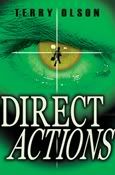 As many of you know, I published my first novel this year. It is a small novel, by a small guy. But it has gotten great reader response. And it has a really cool progressive message.
As many of you know, I published my first novel this year. It is a small novel, by a small guy. But it has gotten great reader response. And it has a really cool progressive message.
I just got my first review of the book, from the local progressive paper, The City Pulse. I wanted to share it with you guys. The reviewer seems to think I’ve created a pretty cool liberal hero, in the tradition of Atticus Finch, and I just have to share his kind words with as wide an audience as I can reach. So here it is in full:
Local Attorney’s Novel Rings Civil Rights Alarm
by Lawrence Cosentino“Direct Actions,” East Lansing lawyer Terry Olson’s self-published first novel, tackles what the author feels to be the defining issue of American politics: the erosion of civil rights in the wake of the Bush administration’s “war on terror.”
The novel’s plot is as topical, and as ominous to civil libertarians, as the phrase “homeland security.” Zeb, a young environmental activist, is caught sabotaging the construction site of an unpopular new retail development. It’s a crime, of course, but under the current political climate it’s also terrorism. The judge tosses the boy in jail without bond to await trial, branding his actions “treason,” and the legal wrangles begin.
“Direct Actions” follows public defender Jeremy Jefferson as he negotiates the shoals of USA Patriot Act-era law in a series of attempts to free the young man. Opportunists, demagogues, and assorted powers-that-be stand in his way, most notably an ambitious governor’s aide who stops at nothing to promote himself as a defender of the homeland. Jefferson’s life is further complicated by the attentions of a seductive journalist.
Olson tells this topical, fascinating story in plain prose that doesn’t get in the way of the book’s real meat: his insider’s knowledge of modern legal process. (He does allow himself the occasional hit of Mickey Spillane: “Jeremy could smell the fear oozing from him.”)
Following Jefferson on his day-to-day business, shuttling back and forth between cluttered offices, dirty prisons and dingy courtrooms, the reader begins to feel the sore feet, red eyes and bruised soul of a public defender.
Despite its topicality, “Direct Actions” belongs to a venerable novelistic tradition. Good-guy lawyers, noble liberals and rumpled small-town attorneys used to stand tall in novels like “To Kill a Mockingbird” and “Anatomy of a Murder.” People admired such men, and actors like Jimmy Stewart, Spencer Tracy or Gregory Peck played them in movies. Jeremy Jefferson is Olson’s attempt to bring this archetype back in the strident, public-relations-circus era of Jeffrey Fieger.
Some of the battles Jefferson faces are familiar. The novel makes it clear, for example, that money still talks in American law. “We have developed a justice system that is responsive to resources,” Olson says. “Although there are exceptions, you get what you pay for.”
But there are new obstacles facing those who would defend dissenters and civil dis-obeyers today. “People are being shouted down,” Olson says. “When I began this novel in 2004, you couldn’t even have a rational discussion about the war in Iraq or our treatment of detainees. This was a chance for me to sit down and share some of my thoughts on what is happening.”
The political message comes through clearly, but not stridently. For many readers the most satisfying thing about the novel is its wealth of everyday details about the criminal justice system.
Having worked for both the prosecution and the defense in small towns such as Howell, Olson was able to formulate a blow-by-blow description of messy legal proceedings.
In his account of a plea-bargain, for example, a prosecutor and defense attorney bat the alternatives back and forth as if they’re playing catch with a torn softball. “It’s scary to think people’s lives get hashed out in these little rooms, and there isn’t enough thought given to the process,” Olson says.
Are there folks out in Howell who will recognize themselves in Olson’s fictional Wabeno County? “Every writer writes from what he knows,” Olson says enigmatically.
Holy cow! Am I mistaken, or did he just subtly compare my book favorably to the work of Harper Lee and John Voelker (aka Robert Traver). I’m too excited not to share it.
I’ve read some things about Ayn Rand’s work, and how it took hold slowly and built a wide audience. While I’m almost one-hundred and eighty degrees away from Ms. Rand’s philosophy, I do take some hope in the way she marketed her book. Of course, these are far different times, so I’m not counting on anything. And I promise that if you hit the recommend button for publicity’s sake, and someday my novel gets Rand-like attention, I will not form a conservative cult with the profits. A progressive cult, well, hmmm, we’ll have to think about it. I’ll get back with you.




